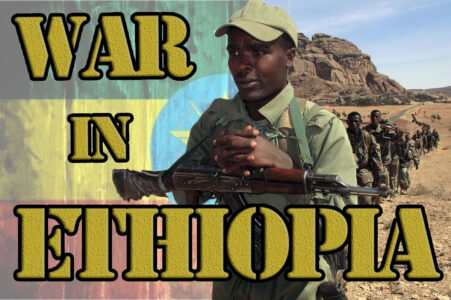
Illustrative Image
Written by Daniel Edgar exclusively for SouthFront.
As the war grinds on in northern Ethiopia, the respective sides are preparing for an escalation in the fighting as the dry season approaches. Although international efforts to persuade the belligerent parties to call an immediate ceasefire have intensified, the irreconcilable differences between the permanent members of the Security Council means that nothing positive can be expected from that quarter in the foreseeable future. In the absence of determined international action aimed at increasing the pressure on the leadership of the main belligerent parties to agree to a ceasefire and the initiation of dialogue to seek a negotiated end to the conflict, the devastating armed conflict seems certain to continue for a lot longer, with large numbers of civilians trapped in the conflict zones the main victims. Multiple reports confirm that civilians in the Tigray region are already dying from starvation, and the number of deaths is certain to increase exponentially unless urgent steps are taken to provide emergency assistance on a massive scale.
The rainy season has temporarily impeded major military offensives, bringing a reduction in the scale of hostilities along most battle fronts over the last two months. Nonetheless, intense battles have persisted on the main strategic fronts, and the Tigray Defence Forces (TDF) have met much greater resistance as their rapid advances during June and July took them further from their core areas and into the terrain of the neighbouring Regional States of Amhara and Afar.
The Ethiopian National Defence Forces (ENDF) have regrouped and managed to not only hold their defensive lines in the Afar and Amhara regions but to retake several areas from the TDF, bolstered by strong resistance from the Amhara Regional Security Forces and militias in the southern and western sectors. The reinvigorated military capabilities and efforts of the ENDF and Amhara security forces have been aided by an as yet unquantified presence of military forces from Eritrea, which reports suggest have been reinforced over the last month to consolidate key military positions in western Tigray and the north of Amhara Regional State.
The few reports that have emerged from the battle fronts indicate that although the TDF have suffered numerous defeats and lost control over several areas in recent weeks, and have as a consequence been pushed back from the furthest points of their advances into Amhara and Afar, it appears that as of yet they have not suffered large-scale losses of personnel and equipment. Thus the extent to which the TDF’s recent withdrawals from several areas in Afar and Amhara was due to battlefield defeats or was the result of strategic redeployments to consolidate and strengthen overstretched defensive lines given the imminent threat of major counterattacks by Eritrean forces from the west and north remains uncertain.
Unless an unexpected development occurs affecting the war-fighting ability of one or more of the belligerent parties, it appears that northern Ethiopia is poised to experience many more months of widespread and intense conflict with neither side in a position to inflict a decisive defeat on the other.
The TDF appear to be consolidating their forces largely within Tigray Regional State proper in order to confront a renewed onslaught by Federal, Amhara and Eritrean forces as the dry season commences, the latter joined by numerous but overall relatively insignificant contributions of personnel and equipment from Afar and other Regional State security forces.
The Federal government has spared no effort or expense in its efforts to reequip its armed forces after the heavy losses sustained between June and August, and numerous reports indicate that it has acquired its own armed drone capacity – apparently including an unspecified number of drones purchased from Iran, Turkey and/ or China, supplementing a limited number of unarmed drones previously acquired from Israel and China. LINK 1, LINK 2
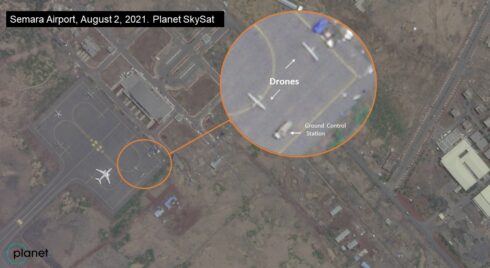
Click to see full-size image
The Federal government has also embarked on a massive propaganda campaign and recruitment drive, urging all Ethiopians of fighting age (except politicians) to join the armed forces and eradicate the TPLF/ TDF from Ethiopia, also trying to persuade Tigrayan soldiers to defect from the TDF in exchange for immunity from prosecution. LINK
Nonetheless, notwithstanding the influx of new recruits and equipment and recent territorial gains, it remains very unlikely that the combined Federal, Amhara and Eritrean military forces will be able to deal a comprehensive defeat to the TDF this year. The strategy of deliberately starving the people of Tigray Regional State and cutting off all essential services will however inflict horrendous suffering and loss of life throughout the region. Recent reports are confirming the scale of the disaster that is unfolding.
In the most extensive account yet of the blockade’s toll, a humanitarian worker, speaking on the condition of not being named out of fear of retaliation, told the AP that deaths from starvation are being reported in “every single” district of the more than 20 in Tigray in which one aid group operates. The group had run out of food aid and fuel…
Major international aid groups like Doctors Without Borders and the Norwegian Refugee Council have had their operations suspended, accused of spreading “misinformation” about the war. Nearly two dozen aid workers have been killed, some while distributing food. LINK
And the unverified and unverifiable reports of ongoing massacres continue. There is no doubt that massacres are being committed in cold blood and that there is tremendous loss of civilian lives due to the combination of calamities afflicting the region, but given the efforts of each side to frame and blame the other for atrocities it would be reckless to accept any of their assertions as fact and the imperative in this respect is gaining access to relevant areas by international exerts to conduct detailed investigations of the crime scenes before they can be altered.
Preliminary evaluation of the TDF’s strategy
The TDF leadership took a huge gamble as their forces rapidly advanced during July and August, deciding to concentrate their forces for three distinct major lines of attack to the south and east instead of contesting the occupied western portion of Tigray, which remains firmly under the control of Federal, Amhara and Eritrean military forces.
The first line of attack, several thrusts eastwards into Afar region, sought to pursue and if possible destroy retreating ENDF forces. It soon became apparent that this offensive also had a second strategic objective, threatening the transport corridor (road and rail) between Addis Ababa and Djibouti (which accounts for over 90% of Ethiopia’s external trade). Although transport along this route has been interrupted over the last couple of months (including due to a – probably – unrelated blockade of the transport route by communities along the border between Afar and Somali Regional States), following the TDF’s retreat/ withdrawal of most of its forces from Afar region in recent weeks it appears unlikely that they will pose a significant threat to the transport corridor in the months ahead.
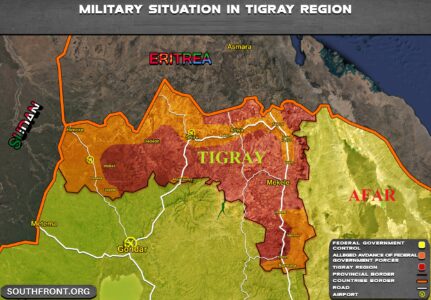
Click to see full-size image
The second line of attack was through Afar and Amhara regions heading south, along the main highway towards the national capital Addis Ababa, with the stated objective of placing psychological pressure on the Federal government coupled with the implicit threat of a possible all out lightning assault on the seat of government if battlefield developments appeared to be favourable. As it turned out, the ENDF has regrouped and this line of attack has proved to be untenable for the foreseeable future.
The objective of placing maximum pressure on the Federal government by the military offensive southwards towards the capital was complemented by the announcement that the TDF was discussing the formation of tactical military alliances with several insurgent groups in other parts of the country. This occurred after the Federal government had drafted the security forces of numerous regional states into the Federal government’s war against Tigray, converting the relatively localized conflict in the north of the country into a war in which most parts of the country were now directly involved in varying degrees (almost all Regional States sending contributions from their security forces to fight on behalf of the Federal government, in most cases probably consisting of units consisting of between several dozen and several hundred relatively lightly armed troops).
The most significant result up to now has been the announcement of a tactical military alliance between the TDF and the Oromo Liberation Army (OLA) of Oromia Regional State. Future developments in Oromia, which accounts for approximately a third of Ethiopia’s population, will be crucial not just for the future course of the current war, but also for the future of the country as a whole.
The third line of attack was directly into Amhara Regional State, seeking to threaten the regional capital of its arch foe and occupy as much of the region as possible (along two distinct fronts comprising the two main roads into Amhara from the north that converge on the region’s capital city). The objective appears to have been to pressure the seat of government and administrative and economic centres of Amhara region directly, and possibly also to obtain some leverage in the event of negotiations (to counter the Amhara/ Eritrean occupation of western Tigray).
Although the TDF managed to make substantial advances along these two main roads into Amhara throughout late July and August, the further they advanced the stronger the resistance became. As had occurred in Tigray previously, the imminent threat posed by the invasion forced most of the distinct political factions and social sectors of Amhara society to put aside their differences and join forces, which they have done.
The political situation in Ethiopia
In terms of the underlying balance of political forces and public opinion, numerous political groups and social sectors are gradually consolidating their efforts and increasing the level of cooperation with other groups with the objective of demanding a ceasefire, an end to inflammatory rhetoric and propaganda, and the initiation of negotiations to seek a political settlement, however these nascent efforts are very far from reaching the scale that would be necessary to place significant pressure on the Federal government and Amhara and Tigray regional governments. LINK
Moreover, the Federal government’s obstruction and persecution of most major opposition political forces combined with strict control over information and communication throughout the country has been largely successful in dominating the national narrative and moulding public opinion to support the Federal government’s military campaign, with no significant backlash as of yet with respect to the Federal and Amhara governments’ decision to involve Eritrean military forces in the dispute.
As mentioned previously, future developments in Oromia Regional State will be crucial. There were widespread social protests in Oromia following the assassination of iconic singer and Oromo nationalist Hachalu Hundessa in June 2020, however they degenerated into violence and looting in most regions and rapidly lost all political significance and direction.
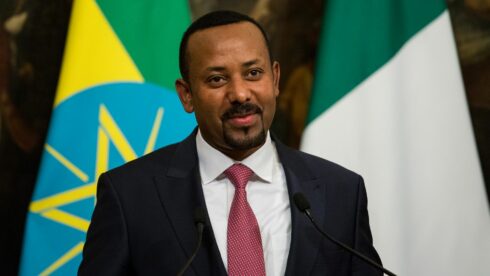
Abiy Ahmed
The disintegration of political and social mobilization in Oromia was completed when the governing ‘Prosperity Party’ of prime minister Abiy Ahmed (which also controls the regional government), faced with stiff competition from opposition political parties in the region (particularly the Oromo Liberation Front and Oromo Federalist Congress), took advantage of the violence and chaos to launch a pre-emptive strike against the opposition. Almost the entirety of the leadership of both major opposition political parties was placed under arrest in the second half of 2020, where they remain to this day, and their offices occupied and sealed off by security forces. Consequently, although discontent with the Federal government, and the prime minister in particular, is high in the region, the ‘Prosperity Party’ won almost all the seats in the region (both for the Federal parliament and the regional assembly) in the June elections. LINK 1, LINK 2
In this context, the recently announced military alliance between the TDF and OLA takes on added significance. While the OLA has obtained some victories in clashes with Federal government and regional security forces, occupying some areas and threatening the main transport corridor to Kenya, it remains incapable of conducting large scale military operations for the moment. LINK Moreover, the tactical alliance with the TDF has alienated some members of the group, and it remains to be seen whether it will grow into a substantial force or fragment and shrink in size and military capabilities in the immediate future. LINK
The discussions with insurgent groups in other regions face similar constraints; they risk alienating many individuals and groups in the respective regions, whether due to lingering hostility against the TPLF from the long period when they dominated the Federal government or due to concerns over the possibility of armed conflict spreading to their regions and intensifying.
The international context
Although there are several basic points upon which all members of the Security Council formally agree – the importance of ending the conflict, addressing the humanitarian catastrophe, maintaining the unity of Ethiopia, and preventing regional instability – they disagree over how these objectives can be achieved and the specific steps that the ‘international community’ can, must and should take to get the belligerent parties to agree to an immediate ceasefire. The African Union is belatedly stepping up efforts to deescalate the conflict and persuade the respective leaderships to agree to discussions, however no significant steps or progress have been achieved.
As a result ‘the international community’ remains completely ineffective and unable to make the slightest dent in the determination of the belligerent parties to take the necessary step of agreeing to a ceasefire and facilitating (or at least not obstructing) the delivery of humanitarian assistance, and all progress in this respect depends for the foreseeable future on the ability of individual countries and regional organizations to negotiate isolated concessions and exceptions to the state of siege to which the Tigray region is subject.
Given the stalemate in the Security Council and the tepid and reluctant tenor of the African Union’s efforts to encourage a ceasefire and initiate negotiations between the warring groups, the US government has announced that it is drawing up a list of political and military leaders from among all the parties involved (the Federal government, Tigray, Amhara and Eritrea) who will be subjected to personal sanctions and travel restrictions if they do not agree to a ceasefire and permit the passage of humanitarian assistance to the most affected regions.
On Friday of last week (the 17th of September) US President Joe Biden signed a presidential decree that authorises a range of individual penalties and sanctions.
The sanctions will target the Ethiopian government, the Eritrean government, the Amhara regional administration and members of the TPLF who are responsible for exacerbating the conflict, obstructing the provision of humanitarian aid or ceasefire, and commit serious human rights abuses…
“The ongoing conflict in northern Ethiopia is a tragedy causing immense human suffering and threatens the unity of the Ethiopian state,” Biden said in a statement, adding that he is “appalled by reports of mass murder, rape, and other sexual violence to terrorise civilian populations”…
He said the Ethiopian Defence Forces, the Eritrean Army, the Amhara Regional State and the TPLF forces involved in the fighting had all committed human rights abuses against civilians, and stated that the US was prepared to impose sanctions if there was no progress in resolving the conflict, but promised that his country would work with the international community to help Ethiopia recover from the war, reduce its debt and revitalise its economy… LINK
Some Ethiopian Diaspora groups in the US are lobbying to have the threat of individual sanctions lifted, and China has also firmly criticized the measure. Of course, China and Russia have also been targeted by both individualized and blanket sanctions by the US, thus while their antagonism towards the adoption of unilateral sanctions is understandable the circumstances are very different, and it is open to speculation as to how much their criticism is based on whether they consider such actions inappropriate and counter-productive in the current Ethiopian context, or whether they are opposed to all US unilateral sanctions as a matter of policy (which is understandable, but in this instance given the refusal of the Security Council to act it is the only alternative left to try to place some pressure on the most stubborn and unrepentant war-mongers responsible for instigating and perpetuating the conflict).
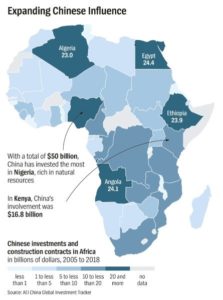
China has been investing heavily in Africa over the past decade, including offering sizable loans coupled to major infrastructure projects. Many Chinese companies have constructed manufacturing facilities in these same countries.
Or, whether they (Russia and/ or China) might even be seeking to cash in on the conflict by selling weapons to the Federal government and gaining some temporary geo-political advantage against the US, portraying the unilateral individual sanctions as the product of an arrogant imperial power – which no doubt the US is, but in this instance the imposition of individual sanctions and travel restrictions on the political and military leaders most responsible for refusing to call a ceasefire has a great deal of merit. By their political and economic actions most if not all of the ‘great powers’ are interfering in the conflict, directly or indirectly, whether by their actions or their refusal to take action.
The major differences between the position of the US and European Union as opposed to the position of Russia, China and India was summed by Ethiopia Insight:
The US and the European nations (on the Security Council) demand the end of hostilities, a negotiated ceasefire, and an all-inclusive national, political dialogue to chart a peaceful future for the country.
At the same time, they blame the federal government of Ethiopia for impeding humanitarian access to the Tigray region, for harassing humanitarian workers, and cutting off telecommunications, transportation, electricity, banking services, and other vital infrastructure.
They accuse the Tigrayan forces of unnecessarily taking the war to the Amhara and Afar regions and demand their withdrawal. They also ask the Eritrean troops to withdraw from Tigray, and the Amhara forces to pull out of the region’s western part…
China, India, and Russia advocate no interference in what they consider an internal Ethiopian matter.
As far as they advocate an end to the conflict, they say it should be left to Ethiopians themselves to resolve their differences. They argue outsiders should respect the country’s sovereignty, territorial integrity, and political independence.
This group also opposes sanctions as a means to force the warring parties to come to the table. Instead, they advocate bilateral, behind closed doors diplomacy… LINK
On this occasion, although the professed respect of China, Russia and India for sovereignty, territorial integrity and political independence is admirable in theory, it can be disastrous when it results in the mechanical application of the principals to complex and catastrophic situations with no examination of the context. Moreover, the stated position fails to acknowledge that there are alternative courses of action that could be taken to put more pressure on the respective parties to end the conflict and facilitate the passage of humanitarian assistance without violating the inalienable rights of peoples and nations to self-determination or otherwise breaching the due application of international law and respect for national sovereignty.
Acting in strict formal accordance and compliance with international law can on occasion have the consequence of exacerbating and prolonging conflicts, particularly if it is used as a pretext to supply weapons to one or more of the belligerent parties on the basis that they have ‘international recognition’ irrespective of how unreasonable and destructive that party’s actions have been.
As is occurring in Yemen, where the senior members of the ‘internationally recognized’ government have been holed up in luxury in Riyadh since they fled the country approximately seven years ago, from where they subsequently endorsed the onslaught that has been waged against the people of Yemen by the ‘Saudi-led coalition’ ever since. LINK
There are not many countries in the world that are less amenable to human rights and freedoms, democracy, and inclusive and representative forms of government than the core members of the Saudi-led coalition that has cut Yemen off from the world by imposing a strictly enforced air, land and sea blockade and contracted large numbers of mercenaries to supplement their military forces in order to invade and occupy the country. Over the last six years the Saudis and UAE have proceeded to carve up and secure control over key strategic areas and resources throughout Yemen, and all developments indicate that they intend to control those areas and resources permanently.
Most media reports about Yemen continue to dogmatically describe the members of the political elite in exile in Saudi Arabia as ‘the legitimate government’, notwithstanding that its members were never elected by the people of Yemen (having been selected by the members of the Gulf Cooperation Council), and that they have cynically and opportunistically provided cover to the Saudis’ and UAE’s horrendous war and blockade against the people of Yemen which has reached genocidal proportions.
As a consequence the military and political leadership of Saudi Arabia and the UAE are able to continue the war and blockade against Yemen not only immune from significant diplomatic condemnation, sanctions or economic penalties (much less investigation for the perpetration of a large number of war crimes and crimes against humanity), but also without formal international restrictions of any kind on their ability to continue procuring weapons on international markets to continue to slaughter. The only limit is their ability to pay. Meanwhile, most of the people of Yemen are being deliberately starved to death, all strictly in compliance with international law apparently.
While it would be unrealistic to expect the Western countries, Russia and China to temporarily suspend their lucrative weapons and oil deals or to downgrade diplomatic and economic relations with the Saudi’s and UAE political and military leadership while the war and blockade against Yemen continues, it would be fantastic if they would at least acknowledge and criticize the ongoing extermination of the people of Yemen and maybe even arrange (and guarantee the security of) some major shipments of food and medicine to get through the blockade as soon as possible.
The report by Ethiopia Insight on the deadlock in the Security Council also notes a third alternative path the Security Council could take, proposed by four countries (Kenya, Niger, Tunisia, and Saint Vincent and the Grenadines) referred to as the A3+1. Kenya’s permanent representative to the UN presented the A3+1 group’s statement to the Security Council on the 26th of August.
Their statement gave context to the fighting. They reasoned that Ethiopia’s conflict resolution mechanisms are inadequate, that the conflict is ethnic by nature, and that the war is about a clash of visions about the country’s political future.
They apportion no blame and urge all parties to reach a peace settlement through negotiations and withdrawal of their forces, including Eritrea…
The group also cautions on the use of sanctions, which they say will lead to the collapse of the Ethiopian economy…
After eight meetings on this particular conflict, the stalemate is causing the Council’s legitimacy gap to grow even bigger, exposing it once again as merely a dysfunctional venue for great-power rivalry.
The sensible approach is for the veto-wielding members of the Security Council and the parties to the conflict to welcome the recommendations offered by the A3+1…
With the Security Council divided and completely ineffective, one of the most elemental steps to deescalate the conflict and promote a more conducive environment for a ceasefire – an embargo on all weapons transfers to the belligerent parties (even if only temporary) – was not even mentioned in the respective statements.
Other elemental measures that must be considered if the international community is serious about facilitating and having a meaningful role in the conflict resolution process, such as the establishment and deployment of monitoring and peacekeeping missions to separate the hostile forces based on the original frontiers of the respective provinces and States, and the organization of teams of experts to conduct investigations at the locations of war crimes and crimes against humanity, are similarly very far from even being formally considered by the ‘great powers’.
Likewise, there has been no consideration of how to organize and guarantee shipments of humanitarian assistance to civilians trapped in the conflict zones, or the viability of declaring limited ‘safe zones’ where civilians can seek at least a minimum degree of security and provisions. While such measures have been cynically and ruthlessly manipulated and abused in the past by the ‘great powers’ to further their own vested interests, this is reason for all members of the international community to strictly monitor the planning, elaboration and implementation of such measures rather than to refuse to consider them at all.






The problem with “international” involvement is the following: The conflict is likely due to that sort of influence. None-inferference is, however, not predicated under international law. In fact, it is legal to declare independence as a people, which is defined by having a territory, permanent population and a government. Sanctions are certainly not helpful. Indeed, for the US, weaponising the dollar in such a way is in fact detrimental to trade and will only further nations turning to other powers.
This war between TPLF terrorists and the Ethiopian forces might continue for about 3 years. The Ethiopian forces will win this war but the sacrifice will be bigger. The reason TPLF terrorists were able to gain upper-hand from June to the first half of August was the Ethiopian side specially the regional forces of Amara and Afar weren’t prepared to the sudden invasion. Once the people get organized and start sending large number of militia, Fano (Volunteer warriors who buy their guns and ammunition themselves) and Leyu Hayl(regional government force), they were able to STOP the expansion of TPLF terrorists and they were able to expel the terrorists from some areas in Amara and completely from Afar, which is flat land and easier for the Afar and federal forces to defeat TPLF terrorists. Amara land is very mountainous like Afghanistan, this one will be difficult as it has many caves, deep gorges and many hide out places for the terrorists. In areas where the terrorists fought face to face they were decimated. But in areas where there were small numbers of defenders the terrorists got the upper hand. The terrorists are even using 12 year children as well as 75 year old grandfathers, this shows their weakness in raising enough able bodied adults. As far as we Ethiopians are concerned, the more terrorists they send the more opportunity we get to eliminate as many terrorists as possible. The future for Ethiopia is great.
As it is always the case with all major terrorists in this world, the terrorists are created or supported directly or indirectly by the West and some Arab vassals of the west. TPLF terrorists are supported by the WEST, EGYPT and Sudan.